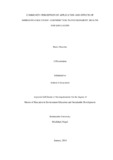
Please use this identifier to cite or link to this item:
https://hdl.handle.net/20.500.14301/228| Title: | COMMUNITY PERCEPTION ON APPLICATION AND EFFECTS OF IMPROVED COOK STOVE: CONTRIBUTION TO ENVIRONMENT, HEALTH AND EDUCATION |
| Authors: | Shrestha, Binita |
| Citation: | Shrestha, B.(2012).Community perception on application and effects of improved cook stove: Contribution to environment, health and education. |
| Issue Date: | Jan-2014 |
| School: | SOED |
| Level: | Masters |
| Program: | KUMSD |
| Abstract: | Excessive dependency on traditional and commercial sources of energy has to be curtailed in order to prevent our society and country from the disastrous situation due to energy crisis in future. To prevent ourselves from being victim of energy crisis, renewable and alternative energy has to replace traditional and commercial sources of energy. With wide spread implementation of renewable energy technologies Improved Cook Stove (ICS) have become an important source of renewable energy for the rural poor. The use of Renewable Energy Technologies can reduce the dependency on traditional sources of energy, and help to protect the environment by reducing the emission of greenhouse gases which in turn can contribute in the protection of environment, in the maintenance of regional balance and in carrying out economic activities smoothly. It ultimately contributes to the improvement of health and education of the people. On this basis the study deals with community perception on effects of ICS, its contribution on children education and articulation of its effectiveness by ICS user. The study aligns to post-positivist paradigm using quantitative method and is confined to ICS user only. For the study, questionnaire survey was conducted to v obtain the required data and information. Sample population of the study was 362. On the basis of sample, respondents were purposively selected from the sampling VDC and municipality of Kavrepalanchok District. The study has revealed that ICS have positive effects on forest and environment conservation. The reduction in fuel wood consumption by ICS has important implications as it can conserve forest, thus, assuring greenery. Women are mainly responsible for cooking activities and collecting firewood. The study reports that ICS has reduced fuel wood consumption and is less time consuming. It has contributed the drudgery reduction of women by cutting down their cooking time and hardship in collection of scarce fuel wood. Furthermore, the use of ICS has supported in deforestation minimization and reduction of indoor air pollution. Women and their children are generally exposed to indoor air pollution. The indoor air pollution due to the combustion of biomass fuel is the main cause of Chronic Obstructive Pulmonary Disease, headache and eye infection in women and children. Study has shown that with the use of ICS human exposure to pollutants in the kitchen environment has been reduced. Furthermore, the use of ICS has contributed on education of children. It has motivated children to study and has improved their health as well by making the indoor air fresh. The efforts by government should be directed towards the large scale dissemination of technology as there is huge potential of ICS in rural areas. Research and development by universities and other research organizations should be conducted to modify the design of ICS for increased efficiency to ensure the sustainability of the technology |
| URI: | https://hdl.handle.net/20.500.14301/228 |
| Appears in Collections: | Research Project |
Files in This Item:
| File | Description | Size | Format | |
|---|---|---|---|---|
| Binita Shrestha_Final Thesis.pdf | 2.74 MB | Adobe PDF |  View/Open |
Items in DSpace are protected by copyright, with all rights reserved, unless otherwise indicated.